
16 Jan Mozambique’s pulp fiction
A Portuguese eucalyptus forestry project is rapidly spreading harmful exotic species in Mozambique’s rural areas in order to supply Europe’s packaging needs. Davide Mancini, Juan Maza Calleja and Boaventura Monjane investigate
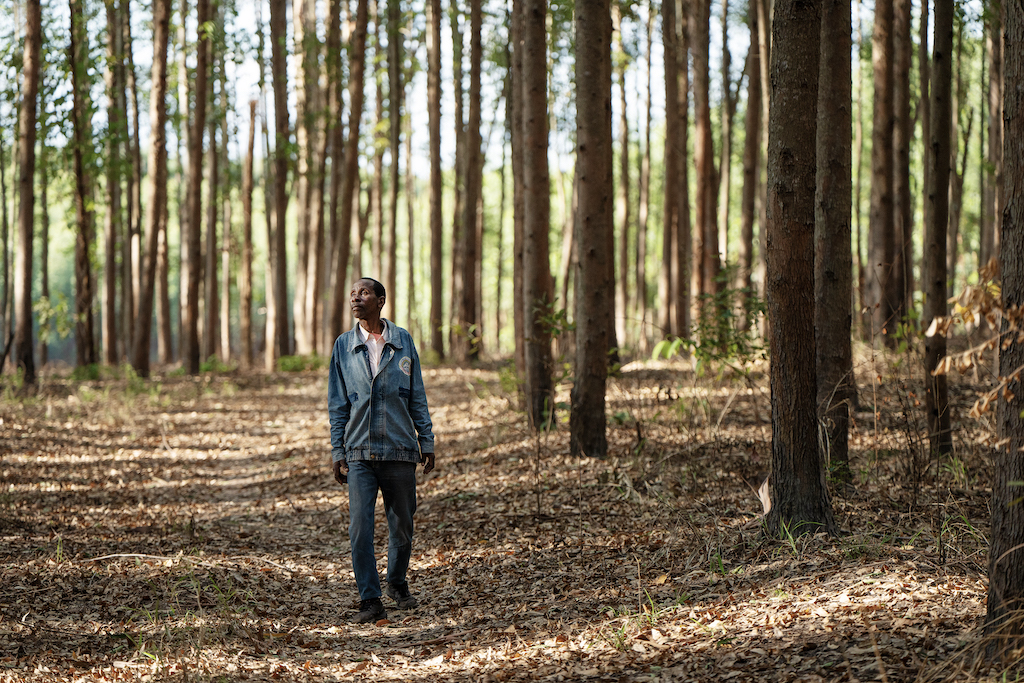
Mugabe Augusto gave up his 1.7ha of land to make way for eucalyptus trees. What was once his field is now part of a symmetrical plantation surrounded by dry undergrowth, indistinguishable from the surrounding parcels of land. Photo: Davide Mancini
Sitting beside his broken-down tractor, Luis André Naite has little hope of reclaiming his land. More than 100ha where he once grew corn, tobacco and beans are now occupied by the eucalyptus plantations of a Portuguese company.
After the civil war ended in the Southern African country in the early 1990s, Naite benefitted from international cooperation programmes to cultivate the extensive lands for which he had inherited usage rights. Within a few years, he employed eight permanent workers and many seasonal labourers to help during harvest time.
“We used to produce 1,300 sacks of corn and sunflower seeds a day, selling them directly to a national company in Beira,” he recalled.
Today, trucks arriving in Beira mostly deliver eucalyptus logs for export from the port. Piled high as they await shipment to Aveiro in Portugal, the logs are the product of a Portuguese pulp project that is rapidly expanding into the country’s rural areas.
Portucel Mozambique, a subsidiary of pulp and paper manufacturer The Navigator Company, secured land-use and exploitation rights from the Mozambican government for 356,000ha, two-thirds of which – around 240,000ha – are slated to become dense eucalyptus plantations.
This includes Naite’s land, which he ceded to Portucel 10 years ago, believing it would bring financial benefits that have fallen far short of his expectations.
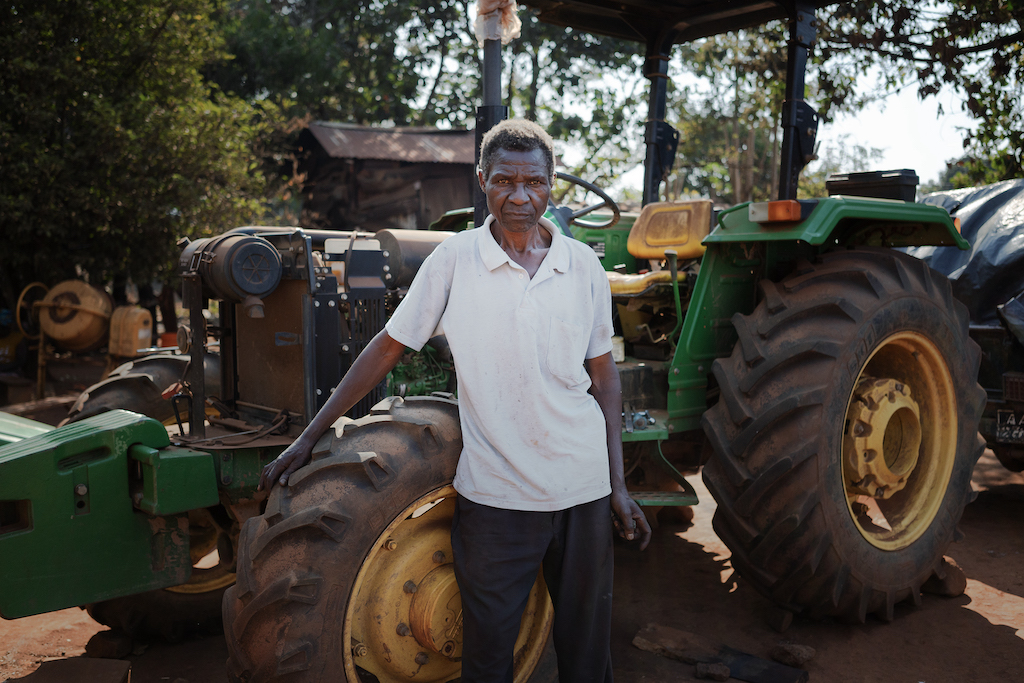
Luis André Naite and his broken-down tractor. More than 100ha where he once grew corn, tobacco and beans are now occupied by eucalyptus plantations. Photo: Juan Maza Calleja
Pulp industry
Eucalyptus is a key resource for the growing global pulp industry, providing the raw material essential for producing all kinds of paper and cardboard. Its use is expected to grow as it replaces single-use plastic packaging across Europe.
E-commerce, food delivery and Europe’s green transition are driving a surge in demand, spurred on by the European Union’s packaging directive approved in April 2024. The new rules require EU countries to reduce plastic packaging waste, and include packaging reduction targets over the next 15 years.
Portugal is Europe’s top producer of eucalyptus-based cellulose, the plant fibre that is converted into pulp. Eucalyptus trees, also known as gum trees, grow very quickly, making them ideal for industrial paper production, used for everything from graphic papers and office sheets to cardboard materials and toilet paper.
“In the past 20 years, cellulose consumption in Europe has risen by 22%, while supply from European forests has only grown by 9%. The gap has been filled by imports,” said Sergio Baffoni, a campaign coordinator at the Environmental Paper Network, which works to transform the pulp and paper industry.
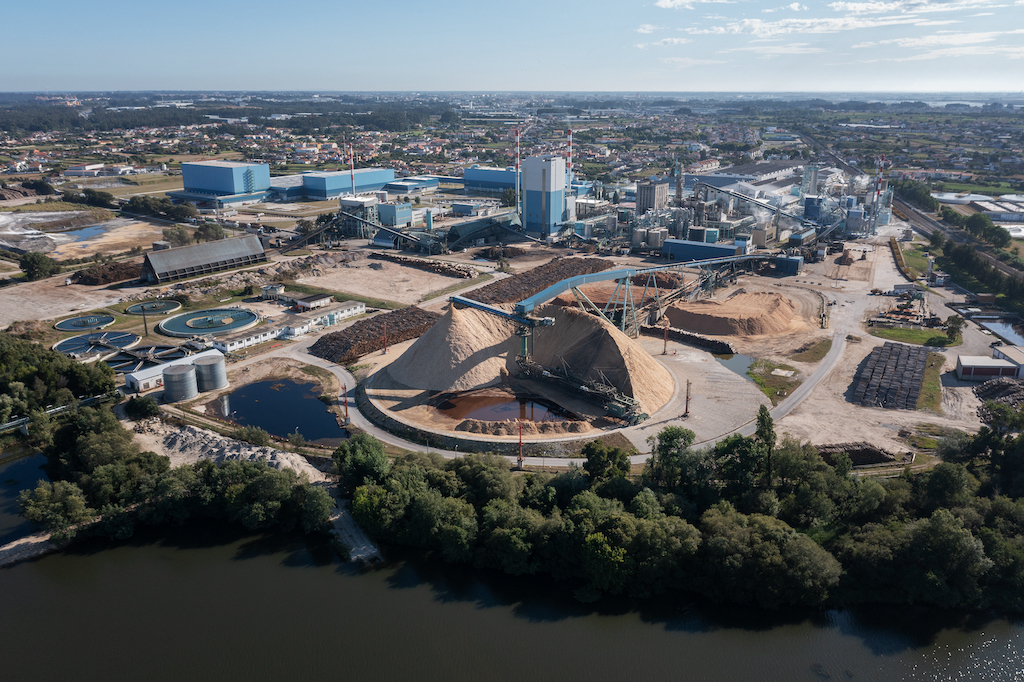
The Navigator Company’s production plant in Portugal. Its plans to establish a plant in Mozambique are delayed due to infrastructure challenges. Photo: Juan Maza Calleja
Industrial giant
Portucel Mozambique counts the International Finance Corporation (IFC), a branch of the World Bank, as a 20% stakeholder. The Navigator Company, formerly known as the Portucel-Soporcel Group, is a Portuguese industrial giant contributing 1% of Portugal’s GDP.
In 2009 it signed an agreement with the Mozambican government to invest $2.5-billion in the Portucel Mozambique project, the largest foreign investment in the forestry sector since the country gained independence from Portugal in 1975.
With a minimum tree harvesting rotation of seven to eight years, so far it has only exported nine shipments totalling 285,000 cubic metres of timber to Portugal from the port of Beira. The eucalyptus grown in Mozambique is also intended to supply the Asian market, particularly China, which has a significant demand for cellulose.
Portucel planned to establish a cellulose production plant in Mozambique, which would produce 1.5-million tons of cellulose annually for export. However, the project is now delayed due to infrastructure challenges, notably the construction of a deep-sea port in Macuse, a critical logistic component for handling the expected export volumes.
In Zambézia, a province in central Mozambique, Portucel inaugurated Africa’s largest eucalyptus nursery in 2015. By 2023, it was producing 1.3-million cloned plants annually, 66% of which are destined for the company’s plantations. To date, only 14,000ha have been planted out of the 237,000ha planned (less than 6%), but not without sparking discontent among local communities.
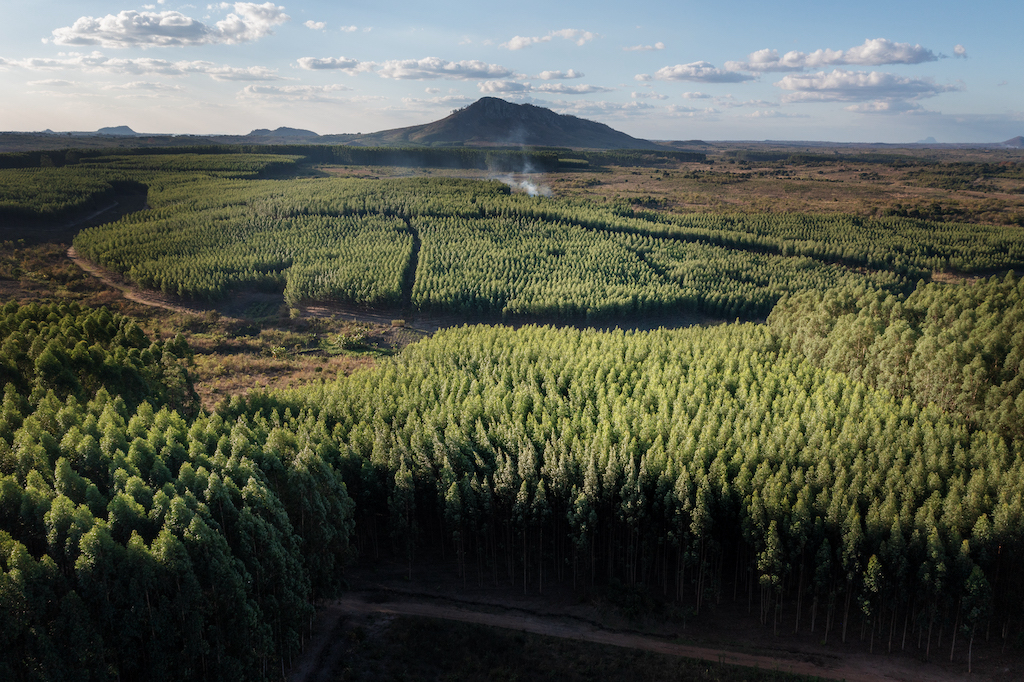
Eucalyptus trees, also known as gum trees, growing in Gondola in western Mozambique. Portucel secured land-use and exploitation rights for 356,000ha, two-thirds of which – around 240,000ha – are slated to become dense eucalyptus plantations. Photo: Juan Maza Calleja
‘Lazy crop’
In Portugal, many landowners in the central and northern regions began planting eucalyptus trees in the 1980s because the species seemed to require little labour and offered a good return: it is still referred to today by many as a “lazy crop”.
Eucalyptus has since become the dominant species in Portugal, reported to cover 26% of the total forest area – the largest proportion in the world relative to the size of the country. The promise of easy profit for small private plots led to a transformation of the landscape, but it did not deliver the expected returns and a large portion of Portugal’s eucalyptus plantations have been abandoned.
Native to Australia, eucalyptus trees are invasive and if left wild without forest thinning, are a ticking time bomb for fires. The Portuguese government decided to curb their spread after the tragedy of Pedrogão Grande in 2017, a massive wildfire that killed 66 people and burned 53,000ha of land, half of which were covered with eucalyptus.
“In terms of biodiversity, it is dangerous because it creates much more frequent fire cycles. And since it’s a monoculture, few other species can coexist with it, which means there are also fewer birds, mammals and insects,” said Domingos Patacho from the Portuguese environmental organisation Quercus.
After every recorded fire in Portugal, eucalyptus is often the first plant to sprout from the ashes. Having evolved in Australia in an environment prone to fires, its strong resilience allows it to recover quickly, giving it a competitive advantage over native plants.
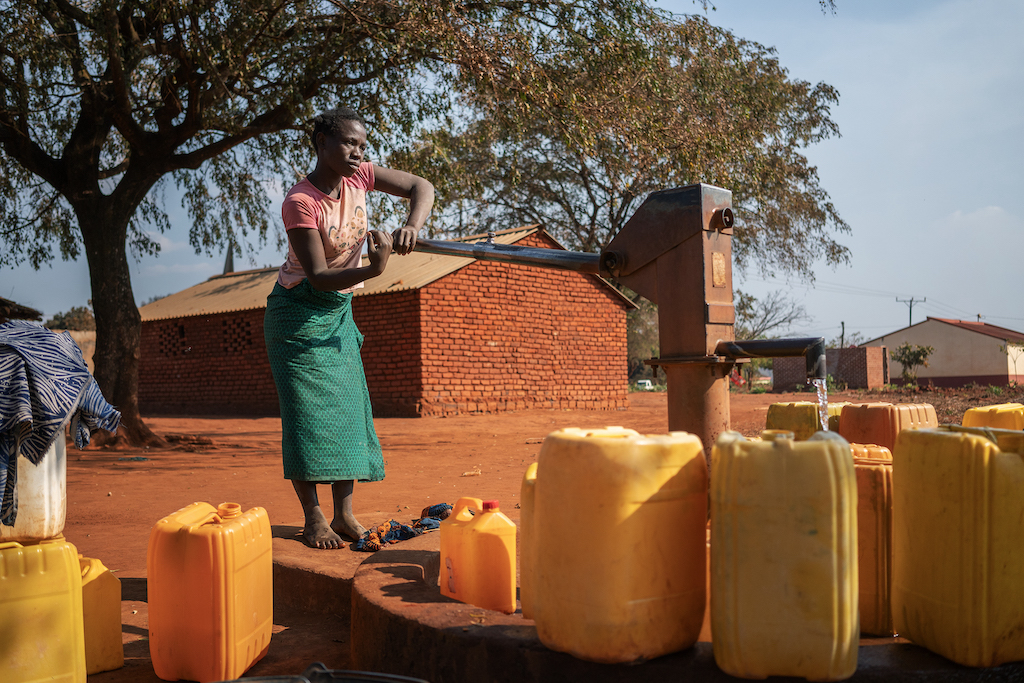
Residents living near the plantations said several wells become unusable during the dry season because eucalyptus absorbs a lot of water from the ground. Photo: Juan Maza Calleja
Thirsty species
It is also a thirsty species and uses the water it encounters with its roots to grow rapidly, before other species can. This is why, in Portugal, each new fire increasingly raises suspicions about these plantations, even though the industry continues to deny any correlation between the plant and the fires.
In Mozambique, the arrival of large eucalyptus plantations is relatively recent, and no fires have been recorded so far. The climate is different from Portugal’s, but eucalyptus remains a species that requires water to grow quickly, and in the central regions, there are increasingly prolonged dry periods.
Mugabe Augusto gave up his 1.7ha of land to make way for eucalyptus trees, and what was once his field is now part of a symmetrical plantation surrounded by dry undergrowth, indistinguishable from the surrounding parcels of land. He points to the well where he used to get water when his family farmed the land, now surrounded by eucalyptus rows over 15m tall.
“Since they planted here, this well and others in the area have dried up because eucalyptus absorbs a lot of water from the ground,” Augusto said. Other people interviewed confirmed that several wells dry up during the dry season, and they are all near the plantations.
However, the company responded that the wells pointed out by the interviewees were already dry before the plantations arrived.
According to Portucel, there is no correlation between the lowering of the water table and the eucalyptus trees. Yet, organisations such as Mozambican NGO Justiça Ambiental have gathered similar complaints from communities in the Zambézia province in recent years.
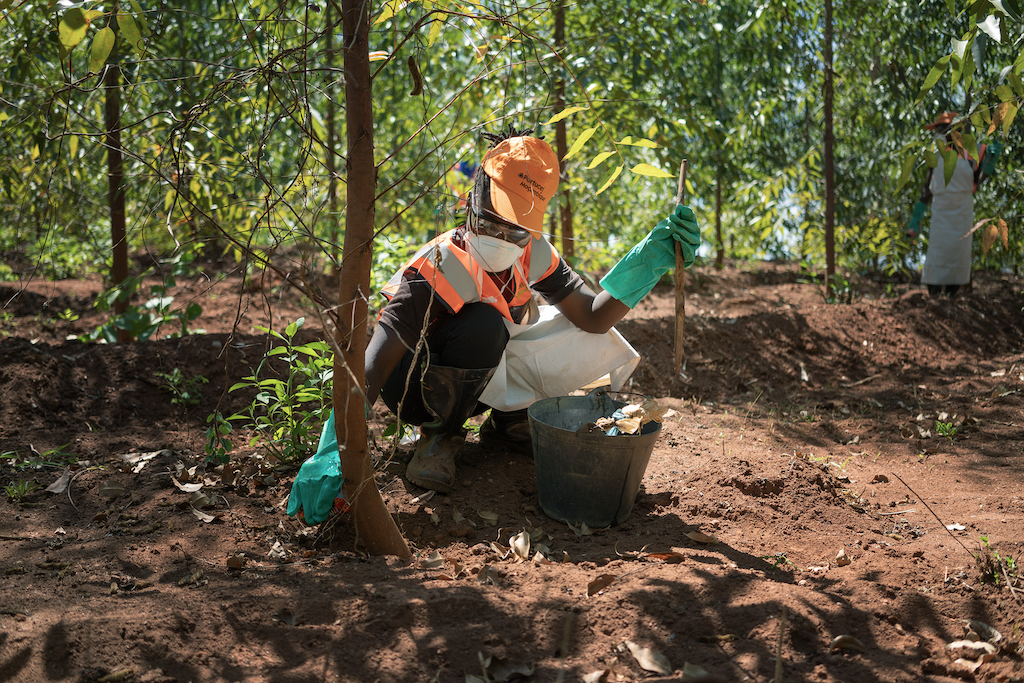
Employees of Portucel Mozambique were observed using the pesticide thiamethoxam, which was banned for outdoor use in 2018 in all EU countries. Photo: Juan Maza Calleja
Groundwater contamination
The use of herbicides and fertilisers in the eucalyptus forests may also have contaminated local groundwater and wells used for domestic purposes. During this investigation, it was observed that employees of Portucel Mozambique were using the pesticide thiamethoxam, applied to the roots of the plants where it is absorbed.
Thiamethoxam, developed by the multinational Syngenta in the 1990s, kills insects that can damage the trunk, such as termites, but also pollinators like bees, which is why its use outdoors was banned in 2018 in all EU countries. The substance is considered moderately hazardous to humans by the United Nations Food and Agricultural Organisation, but it can have severe effects if ingested in large quantities.
In response, Portucel stated that the substances used are within the legal parameters of the country, in accordance with standards set by the IFC and recommendations indicated by international certification systems. The company said the water in the reservoirs near the plantations is tested before and after each rainy season.
Questions addressed to the provincial Department for Land and Environment in Manica remained unanswered at the time of publication.
This investigation was developed with the support of Journalismfund Europe

